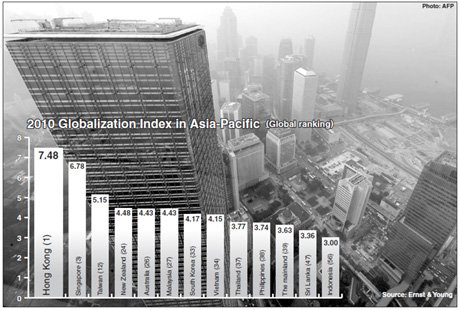City surpasses Singapore as the world's most globalized economy
Updated: 2011-01-25 07:07
By Li Tao(HK Edition)
|
|||||||||

Top spot given for attitudes to trade, capital movement
Hong Kong has topped the 60 largest economies in the world in terms of globalization, according to a survey released Monday by Ernst & Young and the Economist Intelligence Unit.
The Globalization Index 2010 measures and tracks five broad categories in 60 economies including openness to trade, capital movements, exchange of technology and ideas, movement of labor as well as cultural integration.
It surveys more than 1,000 global senior business executives and a number of high-level experts, and Hong Kong surpassed previous winner Singapore to take top spot this year. Ireland also jumped one place to second position while Singapore took third.
"Hong Kong has overtaken Singapore as the most globalized economy in the world. Two out of the top three economies are from Asia-Pacific, which shows how the region is embracing globalization," said Agnes Chan, Ernst & Young's regional managing partner, Hong Kong and Macao.
The mainland climbed one position to 39th in the index, while Taiwan was ranked 12th this time, down from 2009's 11th. The US stepped down four places to 28th in the survey.
Hong Kong's openness to trade, capital movement and cultural integration are all ranked the highest around the globe in the index. Chan said the city's strong trade growth and performance in attracting foreign listings in 2010 helped it to stand out in these sectors.
According to the city's Census and Statistics Department, for the first 11 months in 2010 as a whole, the city's total exports were up 23.8 percent compared with the same period in 2009. The value of imported goods has also increased by 26.1 percent.
Hong Kong was also the biggest IPO market in the world in 2010, seeing a 79 percent rise in fund-raising and a 55 percent increase in the number of new listings compared with a year earlier.
Apart from the unique fusion of "east meets west" culture which Hong Kong has long been recognized for, Charles Ng, associate director-general of investment promotion with Invest Hong Kong, said the city has also been a big beneficiary of the "one country, two systems" policy over the past few years.
"After the financial crisis, global economic development has now put its spotlight on emerging economies, while the mainland is now the largest emerging market in the world," said Ng. "Investors regard Hong Kong as the gateway to enter and invest in the mainland, while mainland enterprises also view the city as a springboard to expand into the international market."
However, maintaining its number one position is nevertheless a challenge, said the report, since the city's expenditure on research and development by the private sector has shrunk by 13 percent from 2006 through 2009, which led to a slight decrease in its score for exchange of technology and ideas.
The report also advises the government to improve environment and education systems to attract more professional talent to work in the city.
"At any rate, effective supervision on financial activities is very important and necessary to Hong Kong," Paul Tang, chief economist with Bank of East Asia told China Daily.
"Hong Kong's biggest advantage - the open economy - is a double-edged sword, which on one hand makes the city rather attractive to foreign investment but also prone to any global financial jolts," said Tang.
On January 13, 2011, a monthly economic report released by Bank of China (Hong Kong) said the city's three advantages have made it able to avoid an Ireland-style crisis - another similarly small and open economy.
Like the US, the report said Ireland's problems was a property bubble embedded in high growth, high debt and leverage. And once the bubble burst, the economy entered into recession while a bank crisis evolved into a sovereign debt crisis.
Although Hong Kong's property prices have seen ups and downs during the crisis, strong support from the mainland economy, and the city's solid banking system have helped Hong Kong's economy achieve a speedy recovery, according to the report.
China Daily
(HK Edition 01/25/2011 page2)